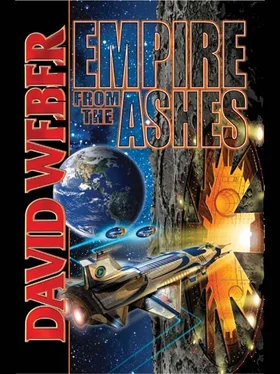David Weber - Empire from the Ashes
Здесь есть возможность читать онлайн «David Weber - Empire from the Ashes» весь текст электронной книги совершенно бесплатно (целиком полную версию без сокращений). В некоторых случаях можно слушать аудио, скачать через торрент в формате fb2 и присутствует краткое содержание. ISBN: , Издательство: Baen Publishing Enterprises, Жанр: Фантастика и фэнтези, на английском языке. Описание произведения, (предисловие) а так же отзывы посетителей доступны на портале библиотеки ЛибКат.
- Название:Empire from the Ashes
- Автор:
- Издательство:Baen Publishing Enterprises
- Жанр:
- Год:неизвестен
- ISBN:0-7434-3593-1
- Рейтинг книги:5 / 5. Голосов: 1
-
Избранное:Добавить в избранное
- Отзывы:
-
Ваша оценка:
- 100
- 1
- 2
- 3
- 4
- 5
Empire from the Ashes: краткое содержание, описание и аннотация
Предлагаем к чтению аннотацию, описание, краткое содержание или предисловие (зависит от того, что написал сам автор книги «Empire from the Ashes»). Если вы не нашли необходимую информацию о книге — напишите в комментариях, мы постараемся отыскать её.
Empire from the Ashes — читать онлайн бесплатно полную книгу (весь текст) целиком
Ниже представлен текст книги, разбитый по страницам. Система сохранения места последней прочитанной страницы, позволяет с удобством читать онлайн бесплатно книгу «Empire from the Ashes», без необходимости каждый раз заново искать на чём Вы остановились. Поставьте закладку, и сможете в любой момент перейти на страницу, на которой закончили чтение.
Интервал:
Закладка:
"Yours and mine both," Colin murmured, drumming on the conference table edge. Then he shook his head.
"Thank you, Dahak. Keep on this for us, please."
"I shall, Sire."
"In that case," Colin turned to Isis and Cohanna, "what can you tell us about how these beasties are put together, Ladies?"
"I'll let Captain Cohanna begin, if I may," Isis said. "She's supervised most of the autopsies."
"All right. Cohanna?"
"Well," Dahak 's surgeon said, "Councilor Tudor's seen more of our live specimen, but we've both learned a fair bit from the dead ones.
"To summarize, the Achuultani are definitely warm-blooded, despite their saurian appearance, though their biochemistry incorporates an appalling level of metals by human standards. A fraction of it would kill any of us; their bones are virtually a crystalline alloy; their amino acids are incredible; and they use a sort of protein-analogue metal salt as an oxygen-carrier. I haven't even been able to identify some of the elements in it yet, but it works. In fact, it's a bit more efficient than hemoglobin, and it's also what gives their blood that bright-orange color. Their chromosome structure is fascinating, but I'll need several months before I can tell you much more than that about it.
"Now," she drew a deep breath, "none of that is too terribly surprising, given that we're dealing with an utterly alien species, but a few other points strike me as definitely weird.
"First, they have at least two sexes, but we've seen only males. It is, of course, possible that their culture doesn't believe in exposing females to combat, but an incursion's personnel spend decades of subjective time on operations. It seems a bit unlikely, to me, at any rate, that any race could be so immune to the biological drives as to remain celibate for periods like that. In addition, unless their psychology is entirely beyond our understanding, I would think that being cut off from all procreation would produce the same apathy it produces in human societies.
"Second, there appears to be an appalling lack of variation. I've yet to unravel their basic gene structure, but we've been carrying out tissue studies on the cadavers recovered from the wreck. By the standards of any species known to Terran or Imperial bioscience, they exhibit a statistically improbable— extremely improbable—homogeneity. Were it not for the very careful labeling we've done, I would be tempted to conclude that all of our tissue samples come from no more than a few score individuals. I have no explanation for how this might have come about.
"Third, and perhaps most puzzling, is the relative primitivism of their gross physiognomy. To the best of our knowledge, this same race has conducted offensive sweeps of our arm of the galaxy for over seventy million years, yet they do not exhibit the attributes one might expect such a long period of high-tech civilization to produce. They're large, extremely strong, and well-suited to a relatively primitive environment. One would expect a species which had enjoyed technology for so long to have decreased in size, at the very least, and, perhaps, to have lost much of its tolerance for extreme environmental conditions. These creatures have done neither."
"Is that really relevant?" Amesbury asked. "Humanity hasn't exactly developed the attributes you describe, either here or in Imperial history."
"The cases aren't parallel, Sir Frederick. The Terran branch of the race is but recently removed from its own primitive period, and all of human history, from its beginnings on Mycos to the present, represents only a tiny fraction of the life experience of the Achuultani. Further, the Achuultani's destruction of the Third Imperium eliminated all human-populated planets other than Birhat—a rather draconian reduction in the gene pool."
"Point taken," Amesbury said, and Cohanna gestured to Isis.
"Just as Cohanna has noted anomalies in Achuultani physiology," the white-haired physician began, "I have observed anomalies in behavioral patterns. Obviously, our prisoner—his name is 'Brashieel,' as nearly as we can pronounce it—is a prisoner and so cannot be considered truly representative of his race. His behavior, however, is, by any human standard, bizarre.
"He appears resigned, yet not passive. In general, his behavior is docile, which could be assumed, genuine, or merely a response to our own biotechnics. Certainly he's deduced that even our medical technicians are several times as strong as he is, though he may not realize this is due to artificial enhancement. He is not , however, apathetic. He's alert, interested, and curious. We are unable to communicate with him as yet, but he appears to be actively assisting our efforts in this direction. I submit that for a soldier embarked upon a genocidal campaign to exhibit neither resistance to, nor even, so nearly as we can determine, hostility towards the species he recently attempted to annihilate isn't exactly typical of a human response."
"Um." Colin tugged on his nose. "How are his injuries responding?"
"We can't use quick-heal or regeneration on such an unknown physiology, but he appears to be recovering nicely. His bones are knitting a bit faster than a human's would; tissue repairs seem to be taking rather longer."
"All right," Colin said, "what do we have? A technology with gaping holes, a species which seems evolutionarily retarded, and a prisoner whose responses defy our logical expectations. Does anyone have any suggestions which could account for all those things?"
He looked around expectantly, but the only response was silence.
"Well," he sighed after a moment, "let's adjourn for now. Unless something breaks in the meantime, we'll convene again Wednesday at fourteen hundred hours. Will that be convenient for all of you?"
Heads nodded, and he rose.
"I'll see you all then," he said. He wanted to get home to Dahak anyway. The twins were teething, and 'Tanni wasn't exactly the most placid mommy in human history.
CHAPTER NINETEEN
Brashieel, who had been a servant of thunders, curled in his new nest place and pondered. It had never occurred to him—nor to anyone else, so far as he knew—to consider the possibility of capture. Protectors did not capture nest-killers; they slew them. So, he had always assumed, did nest-killers deal with Protectors, yet these had not.
He had attempted to fight to the death, but he had failed, and, strangely, he no longer wished to die. No one had ever told him he must; had they simply failed, as he, to consider that he might not? Yet he felt a vague suspicion a true thinker in honor would have ended slaying yet another nest-killer.
Only Brashieel wished to live. He needed to consider the new things happening to and about him. These strange bipeds had destroyed Lord Chirdan's force with scarcely five twelves of ships. Admittedly, they were huge, yet it had taken but five twelves, when Lord Chirdan had been within day-twelfths of destroying this world. That was power. Such nest-killers could purge the galaxy of the Aku'Ultan, and the thought filled him with terror.
But why had they waited so long? He had seen this world's nest-killers now, and they were the same species as those who crewed those stupendous ships. Whether they were also the nest-killers who had built those sensor arrays he did not know. It seemed likely, yet if it were so those arrays must have told them long ago that the Great Visit was upon them, so why conceal their capability until this world had suffered such losses? And why had they not killed him? Because they sought information from him? That was possible, though it would not have occurred to a Protector. Which might, Brashieel admitted grudgingly, be yet another way in which his captors out-classed the Nest. But stranger even than that, they did not mistreat him. They were impossibly strong for such small beings. He had thought it was but the nest-killer's powered armor which had made him a fledgling in his hands... until he saw a slight, slender one with long hair lift one of their elevated sleeping pads and carry it away to clear his nest place. That was sobering proof of what they might have done to him had they chosen to.
Читать дальшеИнтервал:
Закладка:
Похожие книги на «Empire from the Ashes»
Представляем Вашему вниманию похожие книги на «Empire from the Ashes» списком для выбора. Мы отобрали схожую по названию и смыслу литературу в надежде предоставить читателям больше вариантов отыскать новые, интересные, ещё непрочитанные произведения.
Обсуждение, отзывы о книге «Empire from the Ashes» и просто собственные мнения читателей. Оставьте ваши комментарии, напишите, что Вы думаете о произведении, его смысле или главных героях. Укажите что конкретно понравилось, а что нет, и почему Вы так считаете.












